By Uran Kalakulla
Part Thirty-Nine
Nazism and Communism
Memorie.al / Nazism lasted 12 years, while Stalinism lasted twice as long. In addition to many common characteristics, there are many differences between them. The hypocrisy and demagogy of Stalinism was of a more subtle nature, which was not based on a program that was openly barbaric, like Hitler’s, but on a socialist, progressive, scientific and popular ideology, in the eyes of the workers; an ideology that was like a convenient and comfortable curtain to lie to the working class, to lull the sharpness of intellectuals and rivals in the struggle for power.
One of the consequences of this peculiarity of Stalinism is that the entire Soviet people, its best, capable, hardworking and honest representatives, suffered the most terrible blow. At least 10-15 million Soviets lost their lives in the torture chambers of the KGB, martyred or executed, as well as in the gulag camps and others like them, camps where it was forbidden to correspond (in fact, they were prototypes of the Nazi death camps); in the mines in the ice of Norilsk and Vorkuta, where people died from cold, hunger, from crushing labor in countless construction sites, in the exploitation of forests, in the opening of canals and during transportation in leaded wagons, or in the flooded barns of the death ships.
Continued from the previous issue
So it was completely unacceptable for any of them to commit suicide. Why, did God and his messenger on earth ever commit suicide? The man of the world was not only surprised by the party and government communiqué, but he even went so far as to suffer a kind of shock. Sleep deserted him for whole nights, he hated eating, he hardly spoke to anyone in the room, he got up and moved around when it was mandatory, according to the rules, to air out or go to the canteen or to the toilet, like an automaton, without talking to anyone, with his eyes always on the ground, as if he were looking for an explanation of the “thing” that had happened.
This man had been put in prison and sentenced to ten years for agitation and propaganda. With such paranoid adoration for the party leaders in general and for the two main ones, the “commander” and his deputy, “comrade Mehmet” in particular. Well, how could such a thing be possible? Even though he was in prison among us, he never gave up his beliefs, his “ideal”. And the imprisonment had probably been either a misunderstanding or an intrigue by his colleagues from the Mirdita district, as is evident from their admiration for his special “abilities”, not only in the field, but especially for his theoretical skills.
The man of the world, with some kind of course or party school, had a great mind, that he knew the philosophy of Marx thoroughly, the laws of dialectics, that of the negation of negation, and so on. And since he already considered himself a fully formed intellectual, he gave opinions in every field of culture, especially where ideology could enter, even artificially. This certainty and great faith in him often made it more difficult for me to hold my breath. It is not for nothing that the Latin says: “I fear the man who has read only one book.”
Here, such “new people” had been in the Party’s “office”. But let’s return to the loudspeaker, which, above my head, had become a real torture. To pull it out of there? By God! They would find, not one trouble, but a series of endless troubles, not only the wood and the dungeon, but, with mathematical certainty, another ten years of imprisonment.
Imagine, a person would wake up from sleep, under the deafening whistle of the policeman, at five in the morning, let alone in summer, but also in winter, when it was very cold. Exactly at five, in the wake of the dream, where you had seen the beloved people of the family: son, wife, mother, brother and sister. And, after the terrible whistle of the policeman, the loudspeaker would start with the çifteli or ison labe, not about love, but about the party of comrade Enver! Oh great God, what spiritual torture. Its traces are still left in my soul, from those years, the darkest years of my life.
Those who fell from the fig tree
Don’t our people say, about someone who has held a high position in the government, when they are removed and return to being a simple citizen, “ex” or with an ironic twist; “fallen from the fig tree”? I have had the opportunity to meet quite a few of these people during my years of imprisonment. It seems to me that it is worth writing something about them, not so much about their personal values as people, but about an ugly or funny phenomenon, if you will, that has to do with them. State power is a kind of huge theater stage, where certain actors often improvised (and this fact is of great importance in our case!), play a certain role, generally dramatic, sometimes with comic and sometimes tragic nuances, as the case may be.
Thus X plays the role of the King, of a Caesar, Octavian Augustus, Charlemagne, Napoleon, etc. So, all the grandeur of the stage, pomp, glory, hymns with tambourines and hosannas. Another has the role of the close advisor of King Augustus, that of a politician or a fine diplomat. Another of a page who goes around the throne, to be at the King’s disposal at any moment, when he wants something. Another, meanwhile, plays the role of spy or intriguer, another that of the sworn loyalist to the Monarch, and another the role of the jester.
Of what goes on around the throne and within the Royal Court, the people know little or nothing. The common people see only the external splendor, the grandeur of the robes, crowns, scepters, props, trumpets and loud trumpets, parades with bands, with flags, with knights and foot soldiers. And so on. He does not know that the King can barely stand on the throne, that he suffers badly from the plague, that he is not at all interested in the general who stops at the tribune to present his strength, but in his wife the Queen, who has left the throne at that time, because she has a love affair with such and such an officer of the Court, or that his daughter, the princess, is giving birth to a bastard in one of the monasteries of the Kingdom.
Or one of the agents reports to the King in his ear, that he has accurate information, that while the parade is taking place, in such and such a castle, feudal lords have gathered and are preparing a plot to kill the King and overthrow the crown. A little worse, then when some of the King’s “most loyal” courtiers also participate in that plot. Even the King’s number one favorite (lover), who wants to no longer remain such, but to become queen herself. All this may not be true at all, but only a delusion of the paranoid mind of the King himself, who sees nothing around him but conspiracies and intrigues, because he has been busy with them all his life, until he took the throne he enjoys and which he seeks to preserve at all costs, tooth and nail.
Then, the King, once the parades are over, gives orders left and right for arrests, executions and exiles. And his first victims are his closest former collaborators. But it can also happen differently. When the King dies suddenly, from a heart attack, the throne falls into the hands of his son, and then this son throws away his father’s collaborators and fills the Court with young, loyal men, former companions of pleasures, hunting and taverns with dubious names.
What then do the former courtiers, now abandoned, become? They are reduced to simple citizens, as they once were, and then the people see clearly what a load of rubbish they are, who yesterday in power seemed like demigods and whose words (including, of course and first of all, the King himself), seemed like orders and divine words. The people see and hear that they speak like donkeys, which are in fact, almost banal words, from those of the street, and then the people laugh and mock them, or better yet, mock their own donkeyness that they had been accused of.
Even more clearly: comrade Pali, comrade Lenka or comrade Rita was going to a district for inspection and new directives. The news is getting out. The First Secretary of the Party, the Chairman of the Executive Committee, the Chairman of the Internal Branch lead the entire district on foot, even the cooperators: “Comrade Pali is coming, or Comrade Lenka! Oh men, on foot, total mobilization. Don’t even see the donkey dung on the village streets, let alone the others. And listen carefully when Comrade Lenka speaks, because her words are very profound and her head is full of Comrade Enver’s teachings”!
But when “comrade Enver” dies, finally (thank God!) and he himself passes into the inventory of the gatekeeper of hell, or of the storekeeper who equips him with goat horns, like all the others, that is, when “Emperor” Enver dies and his throne is taken by his spiritual son, or his dolphin, comrade Ramiz, things seem to change, because Lenka, Pali, Rita and other comrades fall from the tree and then they return, in a way, to their true and deserved base, as they had been before. So, Lenka to the cooperative’s pig stable, Pali to his “Skoda” truck with a trailer in the Puka mine or woodshed and Rita at the pub counter as a waiter.
Then the people seem to get drunk and see that they were in vain surprised by them, because they no longer talk in big, learned words, about the “law of negation of negation” of dialectical materialism, but about the sow in the stable, about the “Skoda” bed, about the tip in the bar and so on. What if these scoundrels were to come to prison with us, how would they behave, how would they be, how would they talk? Of course, there are examples of this kind. Here, look:
The former head of the Army Security, the former head of the Internal Affairs Branch of Tirana, where dozens of people were killed completely innocently for bombing the Soviet Embassy, back in 1951. Major General Halim Xhelo, in the Laçi prison camp, would walk around with a cup of coffee in his hand, asking the camp fortune teller (a real devil) to tell him his fate and tell him how much prison time he still had to serve, even though he had just “made bismillah” in prison. Meanwhile, in the Burrel prison, he would demand his “rights” and fight with the commander of this prison.
The former second secretary of the Tirana Party Committee, a very wild and fanatical, even more of a cappadocia, (……….) when he was imprisoned and taken to the Ballsh prison camp, he became a spy and a disgusting servile of the command, of Commander Sulë Manoku, being “promoted” to the position of “chairman of the re-education council”. that is, the chief spy, the chief scoundrel, the chief servile, the chief palace guard of the entire camp, even with such zeal (to avoid physical labor and to deserve forgiveness from the People’s Power Party), that from his great zeal he fell ill and died without ever leaving prison!
This former criminal during the War, in the Gjirokastra area, and satrap of education after the War, (for some time also ambassador in Paris, but later fell from grace because he was Bedri Spahiu’s cronies, when he had also fallen from grace), was sending me “many greetings” from the Ballsh prison camp, with a prisoner who came to Burrel prison. He was sending greetings to me, who had argued with him several times in the plenary meetings of the teachers of the Tirana district, because he was picking on me in vain, because I was a “reverse class” and who had barely escaped being fired. And of course I returned the favor, as he deserved.
General Gjin Marku, from the Burreli prison, with the money his family sent him for food, sent telegrams to Enver Hoxha, as long as a newspaper article, wishing him a happy birthday every October 16! Even to the point that the prison operative slammed one of the telegrams in his face, saying: “Go away; fill up with all the telegrams, because comrade Enver has no need for your congratulations”! Lipe Nashi, who escaped being shot in the “oil group”, where former members of the Politburo, such as Abdyl Këllezi, Koço Theodhosi and simple engineers, died in the Burreli prison, was persuaded to accept becoming a cook for the “revisionists”,
Hazbi Lamçe, colonel and former commander of several dangerous prison camps for decades, with the consequences that are known, convicted by his own party for theft a couple of times, and finally as an “enemy”, was reduced to becoming a cleaner of the “revisionist” section of the Burrel prison as well as a spy for the command, to the point that a prisoner, also a former officer, beat him badly, putting his head in the kitchen coal bin. Look how low the “village fell”! Do we need any more facts? Oh great God, what real ugliness and tyrants this unfortunate people of ours has had on their heads, for nearly half a century in a row!
With God’s people
Everyone knows that, in addition to intellectuals (as the brain of the nation), the dictatorship also persecuted with fury the clergy, these representatives of spiritual education. Thus, by cutting off the heads of these people, the body of the people was left without direction and then it was the Party that would lead them towards the cursed path, the path of the devil. And, by overthrowing the King and God by force, the place of both would be taken by the “leader with horns”.
Everyone knows that communism, in its ideological roots, was materialist, that is, atheist. Theoretically, it did not accept
“The One”, be it God or King, in the small material world. Didn’t the first verses of Marx’s First International begin with the denial of any leader, starting with God and ending with heroes, and that “liberation” would be won by the united proletarians themselves? United, but without a shepherd? Who would lead them? The Party would lead them! So, no cult for any leader, of whatever kind, but a “Leading Headquarters”, called the Party. Thus, the “one” was avoided and the notion of a collective leadership emerged.
At first glance, this notion seems truly democratic, popular, and rational. But in reality, under communism or, better to say, in “real socialism”, that is, in the applied theory, the initial ideological notion was completely betrayed. Here, too, the Party was not at all the democratic leadership of a parliamentary republic or a constitutional monarchy, these forms of government established and tested by the efforts and the incessant struggle of democracy over every kind of absolutism and dictatorship where, like the King, like the President, are in fact only symbolically ceremonial and nothing more.
“Heads of state”, because, to put it bluntly, they are only “bosses”! Look at today’s historical reality, a product of evolution and prudence, when the leader in democracy is in fact the parliament, that is, the collectivity. People (those who believe) have only one supreme leader, this is God, great, merciful, creator of the Universe, our world, people and everything. But under communism, even God is dethroned and at the top of everything a “Sun” with teeth is born that, instead of illuminating you and giving you warmth; sometimes bites you like a snake, sometimes like a tiger or a shark and grinds you to the bone.
Thus, the “Sun God” (like the ancient Egyptians), has already become a Lenin, a Stalin, a Mao Zedong and even a certain Comrade Enver. I believe that this is enough to point out both the absurdity and the sophism to the root of the communist ideology, which starts out as super-popular and super-democratic, as long as it is not in power and when it takes power, all kinds of scoundrels appear, stuck on the absolute throne until death, more cruel and arrogant than the pharaohs of ancient Egypt.
All my life, since “I came to my senses”, as a popular Albanian expression says, I have been accustomed to worshiping the luminaries of knowledge and art. I have also been accustomed to honoring such great figures of prominent world leaders as: a Pericles of Athens, a Cato, Cicero and Cincinnatus, a Jefferson or a Kennedy, a Winston Churchill or, an Aidenhuer or Erhard, a Gand or a De Gasper and Sandro Pertini, and so on, others in the field of democracy and humanity.
While on the national level: a Skanderbeg, an Ismail Qemal, a Fan Nol and an Ahmet Zog and on the religious level, where often the exercise of religion was so beautifully harmonized with national and cultural activity: a Pope Vojtila, a Gjergi Fishte, a Shtjefen Gjeçov, a Ndre Mjede, Vinçenc Prenush, again Fan Nol, Father Kisi and Father Ireneu, a Hafiz Ali Korça and others of this caliber.
And, although religiously (since birth), it is my duty to be a Muslim (although no one has asked me about the religion I should choose!), for the Albanian clergy, especially those of the Franciscan order, I have always had a great consideration. As a rule, they never separated religion from the Fatherland and have laid the foundations of our national culture, since the origin. It is enough to mention here Buzuku, Bardhi, Veriboba, Budi, Bardhi, Bogdani, etc.
Precisely, this foundation of tradition was first destroyed by the communists of Enver Hoxha. And this was a centuries-old crime! During the time I was in prison, I had neither the opportunity nor the fortune to personally know such bright figures as: Father Bernardin Palaj, Dom Nikollë Gazulli, Dom Lazër Shantojë, Father Gjon Shllaku, Father Pjetër Mëshkallë, Dom Vinçenc Prenushi and their worthy friends like these. But, I have known Catholic clergymen, such as: Father Konrad Volaj, Dom Nikollë Mazreku, Father Gegë Lumë, Dom Ndoc Nikaj, Dom Simon Juban and some others.
The bloody sickle of the red dictatorship had already done its macabre work on the first luminaries of the Catholic Church. We recall here Father Visarion Xhuvani, Father Ireneu, and Father Kisi of the Orthodox Church or, Hafiz Ali Korça, Hafiz Durguti, Hafiz Ali Tari etc., Islamic clergy. I knew Father Konrad Volja in the Elbasan prison camp, around ’67-’68. He was a man of average height, with a regular face, with an always serious attitude, generally somewhat gloomy, always silent and who preferred to be alone. I had only a polite greeting with him, nothing more. And so I did not approach him (and he did not approach me), wanting to respect his desire for voluntary isolation. / Memorie.al




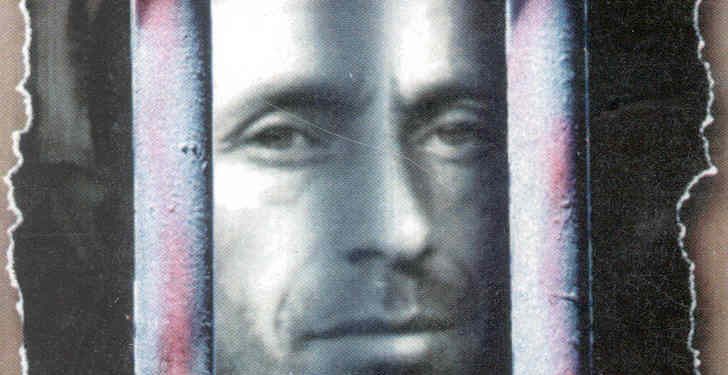
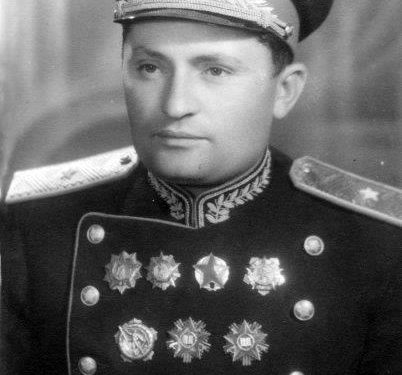
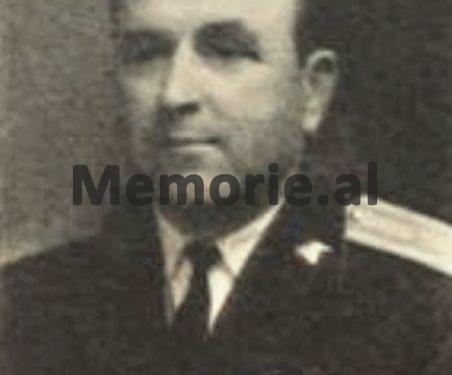
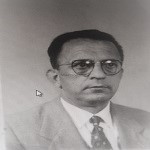

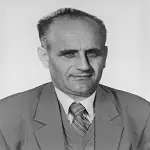
![“The ensemble, led by saxophonist M. Murthi, violinist M. Tare, [with] S. Reka on accordion and piano, [and] saxophonist S. Selmani, were…”/ The unknown history of the “Dajti” orchestra during the communist regime.](https://memorie.al/wp-content/uploads/2026/02/admin-ajax-3-350x250.jpg)
![“In an attempt to rescue one another, 10 workers were poisoned, but besides the brigadier, [another] 6 also died…”/ The secret document of June 11, 1979, is revealed, regarding the deaths of 6 employees at the Metallurgy Plant.](https://memorie.al/wp-content/uploads/2026/02/maxresdefault-350x250.jpg)




